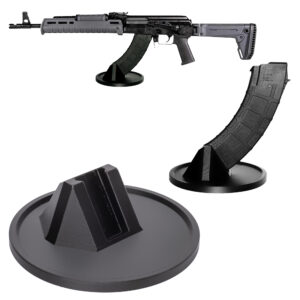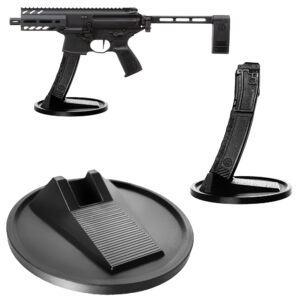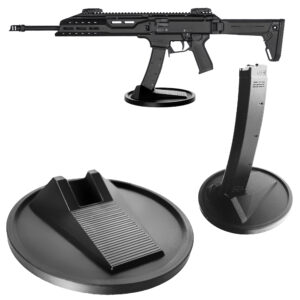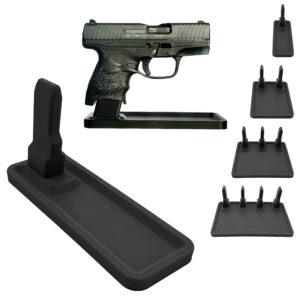
Categories:
Proper ammunition storage is crucial for ensuring the safety of both individuals and their surroundings. It not only helps prevent accidents but also preserves the integrity and effectiveness of the ammunition itself. Adequate storage conditions can significantly extend its lifespan, maintaining its reliability when needed. One primary reason for proper ammunition storage is safety. Ammunition should be kept away from sources of heat, flame, or direct sunlight to avoid potential ignition or explosions.
Additionally, storing it in a cool and dry environment prevents corrosion and damage to the cartridges or casings. Furthermore, proper storage protects ammunition from moisture, which can lead to deterioration and reduced performance. Moisture can cause rusting or damage to primers, affecting their ability to ignite consistently. By understanding the importance of proper ammunition storage, individuals can ensure their own safety while maximizing the longevity and functionality of their ammunition supply.
When it comes to storing ammunition safely, selecting the appropriate container is crucial. The primary objective is to prevent accidental discharge or damage to the ammunition while ensuring its longevity. A sturdy and durable container is essential for safeguarding your ammunition against moisture, extreme temperatures, and physical impact.
Opt for a dedicated ammo can or metal storage box that provides adequate protection from external elements. These containers are typically constructed from high-quality steel, which offers excellent durability and resistance to impact. Additionally, they often feature rubber gaskets or seals that create an airtight environment and prevent moisture ingress.
Consider choosing a container with proper insulation properties to minimize temperature fluctuations. Extreme heat or cold can compromise the effectiveness of your ammunition over time.
Remember, using a dedicated container ensures easy identification and organization of different calibers or types of ammunition, promoting safety and convenience when accessing your stockpile.
Proper temperature and humidity control are crucial factors in ensuring the safe storage of ammunition. Extreme temperatures can cause ammunition to deteriorate, impacting its reliability and potentially leading to dangerous malfunctions. Ideally, ammunition should be stored in a cool, dry environment with temperatures ranging between 55°F (13°C) and 85°F (29°C). Avoid storing ammunition in areas prone to significant temperature fluctuations, such as attics or basements.
Humidity is another critical aspect to consider. High humidity levels can lead to corrosion, which compromises the integrity of ammunition and reduces its shelf life. Aim for a relative humidity range of 40% to 50%, as excessive moisture can accelerate chemical reactions within the ammunition components. Using dehumidifiers or desiccants can help maintain optimal humidity levels within your storage area.
Properly organizing and labeling your ammunition inventory is essential for ensuring safety, easy access, and long-term storage. Here are some tips to effectively manage your ammunition supply:
Proper storage of ammunition is crucial to ensure the safety of both your household and your property. By following these safety measures, you can minimize the risk of accidents or mishaps:
Store them in different secured locations within your storage area. 4. Proper Labeling: Clearly label all containers with the type, caliber, and quantity of ammunition stored inside. This ensures easy identification while avoiding potential confusion. 5.
When it comes to storing ammunition, it is crucial to prioritize safety and adhere to proper handling and transportation guidelines. Firstly, ammunition should always be stored in a cool, dry place away from direct sunlight. Excessive heat or moisture can cause deterioration and compromise the integrity of the rounds. Additionally, it is essential to keep ammunition in a locked container or secure storage unit, away from children or unauthorized individuals.
This not only prevents accidents but also helps maintain its longevity. During transportation, ensure that ammunition is securely packaged in its original container or suitable alternatives designed for this purpose. It should be kept separate from guns and any ignition sources such as flammable materials or open flames. Remember to handle ammunition with care, avoiding dropping or mishandling which could damage the rounds or their primers.
Properly storing ammunition is crucial to ensure its longevity and reliability. However, it is equally important to conduct regular inspections and maintenance of stored ammunition to maintain its quality and safety. Regular inspection involves visually examining the ammunition for any signs of damage, such as corrosion, dents, or bulges. Any suspicious or compromised rounds should be promptly disposed of following appropriate procedures.
Maintenance includes ensuring the storage conditions remain optimal. This includes maintaining a cool and dry environment with controlled humidity levels to prevent moisture damage. Additionally, it is essential to rotate stock regularly by using older ammunition first while replenishing with new supplies at the back.
Furthermore, periodic cleaning of storage containers or safes helps remove dust, debris, and any potential contaminants that may affect the integrity of the stored rounds. By conducting regular inspections and maintenance on your stored ammunition, you can ensure its reliability when needed while promoting a safe storage environment overall.








Colt
Colt M4 Carbine
Colt LE6920
Colt AR-15 A4
Daniel Defense
DDM4 V7
DDM4 V9
DDM4 V11
DDM4 ISR (Integrally Suppressed Rifle)
Smith & Wesson (S&W)
M&P15 Sport II
M&P15 Tactical
M&P15T
Bravo Company Manufacturing (BCM)
BCM Recce-16
BCM Recce-14
BCM MCMR Series
Aero Precision
M4E1 Series
AC-15
AR15 Pistol (Various Configurations)
Ruger
Ruger AR-556
Ruger SR-556
Ruger AR-556 MPR (Multi-Purpose Rifle)
Springfield Armory
Saint Victor
Saint Edge
Saint AR-15
PSA (Palmetto State Armory)
PSA PA-15
PSA AR-V
PSA Jakl (AR Pistol)
FN America
FN 15 Tactical Carbine
FN 15 Patrol
FN 15 DMR
Wilson Combat
Recon Tactical
Super Sniper
Protector Carbine
SIG Sauer
SIG M400 Tread
SIG M400 Elite
SIG M400 SDI
LWRC International
IC DI (Direct Impingement)
IC SPR
IC A5
Bushmaster Guns
XM-15 QRC
Bushmaster MOE
XM-15 Patrolman
Rock River Arms
LAR-15 Entry Tactical
LAR-15 Predator
LAR-15 Elite Comp
Stag Arms
Stag 15 Tactical
Stag 15L (Left-Handed Models)
Stag 15 Valkyrie
Noveske Rifleworks
Noveske Gen 4 N4
Noveske Space Invader (AR Pistol)
Noveske Recon
Anderson Manufacturing
AM-15 Optic Ready
AM-15 M4 Carbine
AM-15 Precision Rifle
Adams Arms
AA-15 Piston Rifle
P2 AARS (Adams Arms Rifle Series)
Black Rain Ordnance
SPEC15 Series
BRO Predator
Fallout 15
Diamondback Guns
DB15 Series
DB15CCMLB
DB15EB
Del-Ton Inc.
DTI-15
Del-Ton Echo 316H
Sierra 316M
Windham Weaponry
Windham SRC
Windham VEX-SS
Windham RMCS-4 (Caliber Conversion System)
Christensen Arms
CA-15 G2
CA-15 Recon
CA-15 Titanium Edition
Patriot Ordnance Factory (POF-USA)
Renegade Plus
P415 Edge
Revolution DI
LaRue Tactical
PredatAR
OBR (Optimized Battle Rifle)
LaRue Stealth 2.0
Battle Arms Development
Workhorse Patrol Carbine
BAD556-LW (Lightweight)
Authority Elite Rifle
Faxon Guns
Ascent AR-15
FX-19 (AR Pistol)
Streamline Ultralight Series
KE Arms
KE-15 SLT (Super Lightweight Tactical)
KE-15 Scout Carbine
Primary Weapons Systems (PWS)
MK1 MOD 2-M
MK116 PRO
MK107 (Piston AR Pistol)
ZEV Technologies
ZEV Core Elite Rifle
ZEV AR15 Billet Rifles
Franklin Armory
BFSIII AR-C1
Militia Model
F17-L (Chambered in .17 WSM)
Seekins Precision
SP15 DMR
NX15 Skeletonized Rifle
Havak Bravo
Aero Precision (Additional Models)
EPC-9 (Pistol Caliber ARs)
VG6 AR Rifles
Barrett Guns
REC7 DI
REC7 Gen II
CMMG
MK4 RCE
Resolute 300
Banshee (AR Pistol)
DPMS Panther Arms
Panther Oracle
Panther LR-308
H&K (Heckler & Koch)
HK MR556A1
HK416 (Military Variant)
Rock Island Armory (Armscor)
VR-80 Tactical AR (Shotgun AR Platform)
Troy Industries
Troy SPC-A3
Troy PAR (Pump Action AR)
Wilson Tactical
Tactical Recon AR
Protector Series
F1 Guns
FDR-15 Skeletonized Rifle
BDRx-15 Series
Juggernaut Tactical
JT-15
JT-10 Precision Rifle
AeroSurplus
Surplus AR-15 Rifles (Budget Models)
Thunder Tactical
AR-15 Basic Carbine
Tactical Builder Sets
Radical Guns
RF-15
Forged AR-Series
Dark Storm Industries
DS-15 Featureless Rifles
DS-10 Typhoon
DRD Tactical
Paratus
Aptus AR Rifles
Bear Creek Arsenal
BCA-15
AR Complete Upper Builds
Aero Survival Rifles (ASI)
ASR Tactical Series
Tactical Edge
WARFIGHTER Series
AR-15 Lightweight Rifles
Lone Star Armory
TX15 DMR
TX15 Carbine
HERA Arms
HERA H7
HERA AR-15 Lower Builds
IWI (Israeli Weapon Industries)
Zion-15
DRD Tactical
Tactical Modular Rifles
Quick-Takedown Rifles
V Seven Weapons
1776 Rifle
Hyperlite Rifle
Core Rifle Systems
Core15 Tac III
Core15 Patrol Rifle
Armalite (Original AR-15 Creator)
M15 Tactical
M15 A4 Carbine
DEF15 (Defensive Sporting Rifle Series)
PSA (Palmetto State Armory Additional Models)
PSAK-47 Hybrid (AR-AK Style Hybrid)
PSA Dagger (Pistol Caliber Configurations)
Odin Works
OTR-15
Odin Recon Rifle
Maxim Defense
MDX-508 PDX (Compact AR Pistol)
MDX-510 Rifle